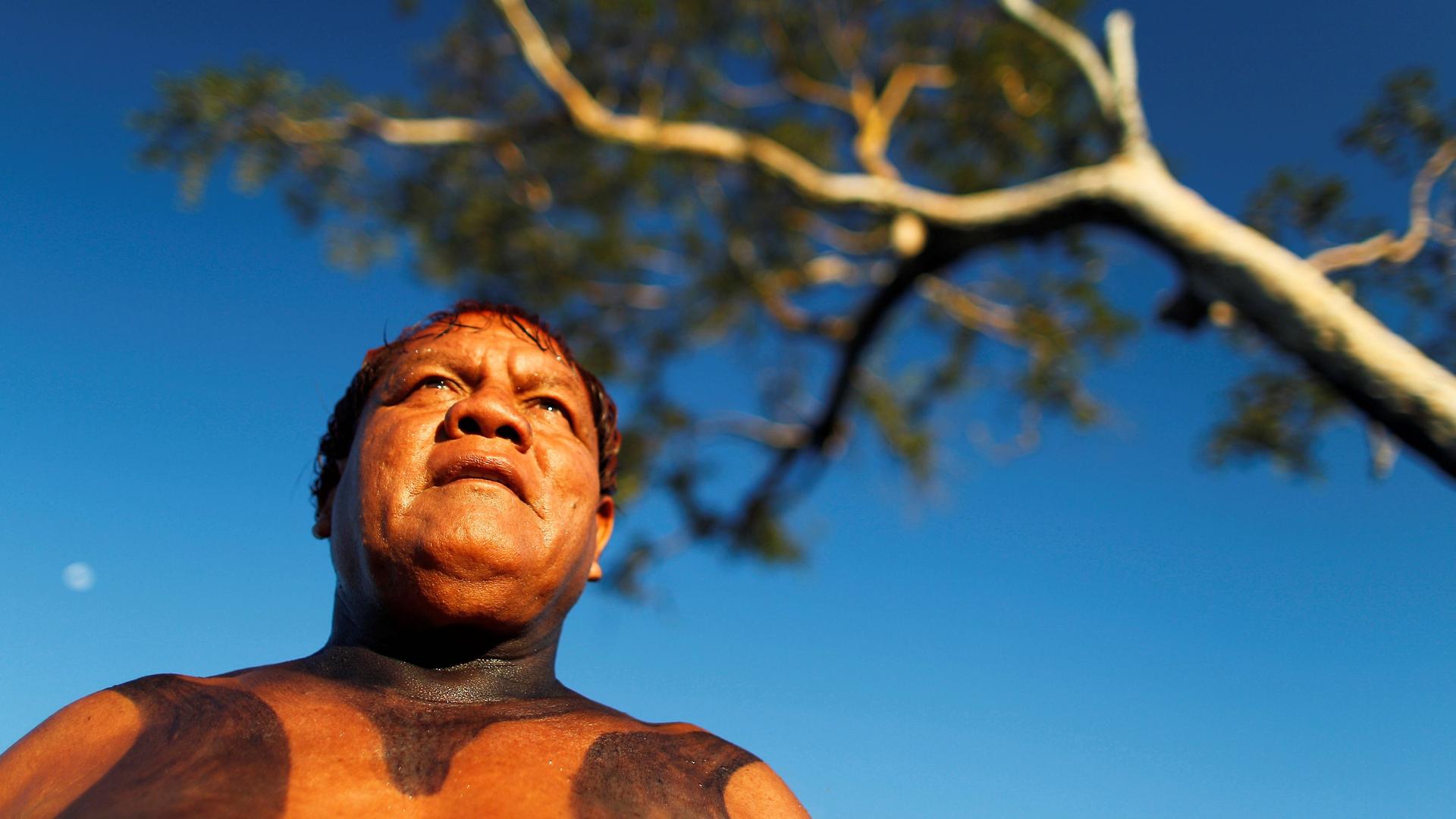Chief Aritana Yawalapiti led his people for five decades. During his life, he fiercely defended his people’s traditions and land. He was instrumental in the creation of the 6.5 million-acre Xingu Indigenous Territory and was recognized as one of the greatest warriors of his people.
The Indigenous people of the upper Xingu are known for their elaborate funeral rites ceremony. In a video posted online to raise funds for the community amid Aritana’s illness, young warriors in colorful clothing dance and sing and then face off against each other in a wrestling battle. It represents the close of a long process of mourning.
Related: Brazilian housing movements fight surging evictions amid coronavirus
Now, the funeral ceremony will have to be held for him.
Aritana died on Aug. 5 from COVID-19 at a hospital in Goiânia. His brother Matariwá and his niece Nhapukalo also died of the coronavirus in recent weeks.
“Aritana played a very important role in calling attention to and raising the awareness of the different peoples there about the risks and the dangers that surrounded the Xingu Indigenous Park,” said André Villas-Bôas, the executive secretary of the Socio-Environmental Institute, during a recent radio report. “And his generation of leaders is leaving.”
Aritana is just one of 170 Indigenous elders and leaders in Brazil who have died so far from COVID-19. It’s a devastating loss that’s impacting Indigenous peoples across the country.
“We can’t bring these people back to reshare their knowledge that they acquired over their long lives. Our major concern is to monitor our leaders that are left with traditional knowledge and find a way to record their learning in order to carry on.”
“We can’t bring these people back to reshare their knowledge that they acquired over their long lives. Our major concern is to monitor our leaders that are left with traditional knowledge and find a way to record their learning in order to carry on,” said Nildo Fontes, a member of the Tucano people in the Upper Río Negro, near the Brazilian borders with Colombia and Venezuela.
Related: Indigenous mothers in Brazil mourning their children’s deaths seek closure
He lost his uncle, a tribal elder, to the coronavirus. He says in many ways, the pandemic caught them by surprise, but they are trying to develop strategies to now learn all they can from the elders who are left.
Vovó, or grandmother Bernaldina, is another. She died in late June. She was an artist and a healer from the Macuxi tribe in the Raposa Serra do Sol territory, along the border with Guyana.
“She was one of our greatest and most active teachers because she knew most of our traditions and made them accessible, as opposed to others who can’t or don’t want to share their knowledge,” said her adopted son, Jaider Esbell.
Esbell is an artist who says her song, her voice and her love gave her an uncanny ability to straddle the worlds between the Indigenous and Western cultures.
Related: Fires and coronavirus are a deadly combination for Amazon’s Indigenous people
“I’m now working on a project to construct a type of art gallery as a memorial for Vovó Bernaldina, in the community where she lived, as a way to keep her memory alive and carry on her work,” Esbell said.
Language is among the most important types of ancestral knowledge that is fading with the loss of these elders.
“There are roughly 150 to 160 Indigenous languages spoken in Brazil today, which is what is left of a diversity that was much greater at the time of the conquest,” said Bruna Franchetto, a professor of linguistics and anthropology at the Federal University of Rio de Janeiro. “But many groups only have the very last few speakers. That is our biggest concern. These are what UNESCO calls severely endangered languages.”
Many of those speakers are dying. Chief Aritana was one of the last Yawalapiti Native speakers. These languages are being lost and with them, a piece of their identity.
Related: Paulinho Paiakan is remembered as a hero to Indigenous Brazilians
If there is any silver lining, Almerinda Ramos de Lima has seen it. She’s the director of the Federation of Indigenous Organizations of the Rio Negro, representing 23 tribes and roughly 29,000 families. She’s the first woman to be elected to that position. She said that recently, she visited dozens of communities. COVID-19 had infected people in every village, but she was inspired.
“It was powerful to see and hear how they cured themselves. They didn’t wait for exams. They didn’t wait for doctors to arrive. Each community organized and shared the traditional medicines that they were preparing.”
“It was powerful to see and hear how they cured themselves,” Almerinda said. “They didn’t wait for exams. They didn’t wait for doctors to arrive. Each community organized and shared the traditional medicines that they were preparing.”
Almerinda says they even shared recipes and plants between villages and tribes, a sign of the importance of valuing their ancestral knowledge and territories.
“Where we have forests, where we have plants, we have traditional medicine,” she said. “We have our cure inside the forest.”
